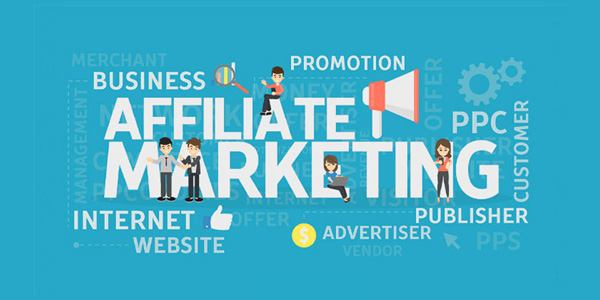- Tools
- Learn
- Help
Before you leave..
Why not download RevGlue latest free eguide.

If I told you there is a low-risk form of advertising that would enable you to reach new audiences with a minimal investment of time and money, you’d be ready to sign on the dotted line, wouldn’t you? Today, we’re diving into the benefits of affiliate marketing for small and medium-sized enterprises in the UK. Whether you’ve tried affiliate marketing with little success in the past or this is the first you’ve considered implementing the strategy, we’re here to give you the insider tips and strategies that will make your affiliate campaign a success.
Content
What is affiliate marketing and how does it work?

Not too long ago, product sales were limited to purchases in-store, through catalogs, or through door-to-door sales. Affiliate marketing is the less-intrusive, modern cousin of the door-to-door salesman. According to Adweek, 53% of women made purchases due to influencer posts, highlighting the important role of sales through trusted voices. Word-of-mouth advertising from publishers can build brand trust and increase sales.
Affiliate marketing utilises bloggers’ spheres of influence to promote a product to a new audience. When a sale is made using their unique link, bloggers are rewarded with a commission. While Cost Per Click (CPC) and Cost Per Lead (CPL) models are sometimes used in affiliate marketing, most brands use Cost Per Acquisition (CPA), and reward the commission to the publisher who prompted the last click before a sale. This win-win form of advertising is low-risk for brands, with unlimited potential for earnings by the blogger.
With sales tied to the Unique ID of a publisher (blogger, influencer, or website), it’s easy to measure and track success with affiliate marketing.
What is the size of the market in the UK?

According to the IAB UK’s Digital Adspend report for 2020, conducted in collaboration with PwC, the affiliate market is currently worth a total of £627 million. With the rise of online shopping during the pandemic, affiliate sales increased 10% year on year. But we don’t see the growth of affiliate marketing slowing down anytime soon.
Effective ways to recruit affiliates.

Before we dive into effective ways to recruit influencers, let’s talk about what not to do. Don’t slide into an influencer’s DMs or email inbox with a generic “hey there” message. An affiliate relationship should be mutually beneficial, and you should put some thought into the types of bloggers and influencers you message. And always use their first name and blog in your pitch email or DM! If nothing else-- they’ll know you took the time to personalise the message.
Now that we’ve covered the no-nos, let’s talk about steps to take to find publishers who will convert:
1. Do some social media reconnaissance. Who is already talking about you? Your greatest cheerleaders are the ones who use and love your brand before you offered a financial incentive. Reach out to them directly to thank them for sharing your brand in the past and talk about an affiliate relationship going forward.
2. Use social media and Google to discover influencers and bloggers in your niche. If you’re a beauty brand-- look for bloggers who talk about beauty. Do some research on their past campaigns to make sure their content matches your brand messaging.
3. Don’t get caught up in the numbers. A smaller, engaged beauty blogger will yield more results than a giant food blogger promoting your beauty product.
4. Consider a welcome gift for new publishers. While it’s not necessary, sending a small gift to bloggers and influencers will give them something to talk about with their audience, and promotes a good working relationship.
But my marketing is effective… why should I add something else?

“I’m making enough money” - said no one ever. Often, the fear of investment keeps brands from growing and earning to their full potential.
Marketing isn’t free. Social media ads, Google ads, search engine optimisation, and print marketing require an investment of time and money. Affiliate marketing is an anomaly. With a minimal investment in setting up an affiliate programme and commissions paid to bloggers, an affiliate programme practically runs itself. In fact, one article by Business World showed that the cost of sales through Google Ads can require up to 20x the cost of sales through affiliate marketing.
While some businesses pay to optimise their SEO, an affiliate strategy complements your SEO strategy through link-building from your publishers.
Note: To stay in compliance with Google’s rules about links, website owners should always use a sponsored link tag to indicate that they may make money from the link.
While you may be based in the UK, that doesn’t mean that someone in Australia or the USA couldn’t benefit from your product. Affiliate marketing gives you unprecedented access to consumers outside your typical market. Before affiliate marketing, launching a worldwide campaign was a costly endeavour. Now, it’s a no-brainer.
You’re not alone in managing affiliate marketing

If the thought of establishing, managing, and tracking affiliates feel overwhelming, we understand! Thankfully, there are businesses dedicated to making affiliate marketing a seamless process for bloggers and businesses-- because an easy system is one that will be used more frequently! We’ve compiled a list of how to run your affiliate marketing campaigns-- with and without help.
In-house affiliate marketing
For a hands-on, DIY approach, in-house affiliate marketing gives you ultimate control over your strategy. Build an affiliate platform to meet your brand’s unique needs or buy a ready-to-use model.
By choosing this strategy, you have ultimate control over which publishers to work with and the commission to assign to each publisher-- without losing a cut to agencies or data managers. With an ear to the ground approach, you can make changes to your affiliate programme quickly to ensure a successful programme for both your brand and the publisher.
Keep in mind-- what you save in money by managing the programme in-house, you lose in time, as you research best practices and reach out to publishers. Ensure proper bandwidth in your workforce before beginning an in-house strategy.
Affiliate marketing agencies
Affiliate marketing agencies focus their entire business on affiliates and gain incredible insight in doing so. Their connections can help you establish relationships with publishers, and give insight into which publishers are likely to yield the best results for your specific brand.
As you look for affiliate marketing agencies with whom to partner, consider their current publishers and clients. Do they have an established list of publishers in your niche? Are their clients your competitors? If so, be sure to find out the agency’s policy on conflicts of interest.
Some affiliate marketing agencies provide hands-on help with product development and testing for affiliates-- managing the process from start to finish. Consider your needs and whether the agency scales its services.
Ask questions about analytics. What can the agency provide? Are you able to make changes quickly, and without much red tape?
Affiliate marketing agencies can be the difference between getting your affiliate marketing programme up and running quickly with quality publishers, and spending time slogging through the internet trying to find your own publishers and negotiating each contract individually.
If your current marketing agency has an affiliate marketing arm, it may make sense to utilise their in-depth knowledge of your brand to further your overall strategy with affiliates.
In the end, affiliate marketing agencies are a big investment, which turns a low-risk strategy into a more costly one.
Affiliate networks
Affiliate networks are a popular way to bridge the gap between publishers and affiliates. Amazon Associates, Booking.com, eBay, ShareASale, and CJ Affiliate are a few of the most popular and lucrative affiliate networks on the market now.
Publishers register with the affiliate network and (in most cases), can promote and earn a commission while promoting any product on the platform. In some cases, publishers must gain the approval of the affiliate to get access to a Unique ID.
Affiliate networks take the legwork out of discovering publishers, although you may lose control over which publishers are allowed to promote your product.
Data Managers
Affiliates may choose to work with multiple affiliate networks in order to make promotion easy and accessible for publishers. However, multiple networks lead to complex content without a standard format across different networks for cashback, coupons, group deals, or price comparison data.
Data managers work to manage content and clean up data for reporting and tracking for a seamless, albeit costly, experience.
SaaS tools
As an answer to the high cost of a dedicated data manager, RevGlue is a SaaS (software as a service) tool that acts as the glue between affiliate networks and online publishers. Our mission is to help site owners with content retrieval by combining multiple affiliate networks into a single structured format. Our useful tools aid in the distribution, promotion, and monetisation of websites and mobile apps.
Say goodbye to the costly services that are reliant on the availability of an account manager, and digitise your affiliate marketing through easy-to-use software. And unlike some agencies and networks that work on a profit-sharing model, with RevGlue you pay a low monthly fee and keep 100% of your commissions-- with no long-term contracts.
Top tips for tracking

While tracking the success of marketing campaigns can be difficult with word-of-mouth and in-person campaigns, affiliate marketing makes tracking easy. The benefits (and importance) of tracking are two-fold. Since commissions are paid based on each publisher’s unique ID, it’s imperative to assign links that can be easily tracked. Secondly, the ability to measure unique sales gives you the data needed to identify popular products, and optimise campaigns to take advantage of trending items while boosting other products.
Since you may use multiple affiliate networks, you’ll need to track across platforms. That’s where Rev Glue comes in. Our statistics module collates all your reports in one place. We obtain sales/conversion data from all the UK affiliate networks and direct merchants and offer it as a monthly subscription via a single API so you can quickly see how much you’re earning across each network.
With an easy-to-read dashboard, you can spend less time focusing on the numbers and more time on the strategy to keep increasing those numbers!
How to get started with an affiliate programme

The first step to get started with affiliate marketing is to decide on a strategy. Will you choose to manage your marketing in-house or outsource to an affiliate marketing agency or affiliate network. Now, it’s time to get started. Agencies and networks can help you through the process while selecting an in-house strategy will require more hands-on research and testing.
As soon as you’re set-up, you’ll want to set up a system for tracking, measuring, and optimising your campaigns. RevGlue is so confident you’ll love our one-stop shop that we’re giving you a free 30-day trial of our services. Just sign up here to get started.
As you grow your affiliate marketing, there are a few things to keep in mind:
● Do some reconnaissance on your competitors’ affiliate strategy -- the success of your program isn’t reliant on your product alone. Analyze their commission percentage, sales, and perks and factor those into your strategy.
● Based on those factors, choose a commission.
● Set measurable goals.
● Provide training for your publishers to establish what is and is not appropriate in terms of promotions.
● Regularly track affiliate performance.
In 2017, advertisers invested nearly £9.4 billion in affiliate marketing globally. That number continues to trend upwards every year, and now is the time to launch your affiliate marketing campaign. In a study published by Rakuten Marketing, we learn that 80% of advertisers utilise affiliate marketing, 90% of whom say it’s “important or very important to their overall marketing strategy.” With online shopping on the rise, now is the time to invest in an affiliate marketing strategy for your SME in the UK.
Affiliate marketing is not an easy business to get into, but if you follow the steps outlined above and research where to start, it can be rewarding in terms of increased revenue. You need to remember no matter what you do; there will always be challenges. There are no shortcuts in this business, so it's important not to get discouraged and stay committed. Tackling those challenges one at a time and use the right publisher tools such as RevSocial, RevLinks, RevEmbed, RevAds, you can make affiliate marketing a profitable business that you are proud of. With RevSocial, for example, you can turn your social media account into a money-making machine in minutes. It allows you to search and find deals that pay you a commission. Once you do that, just post them to your social media account to get paid. RevSocial will take care of the rest. And if you want to monetise content on your website instantly, RevLinks will do that for you.